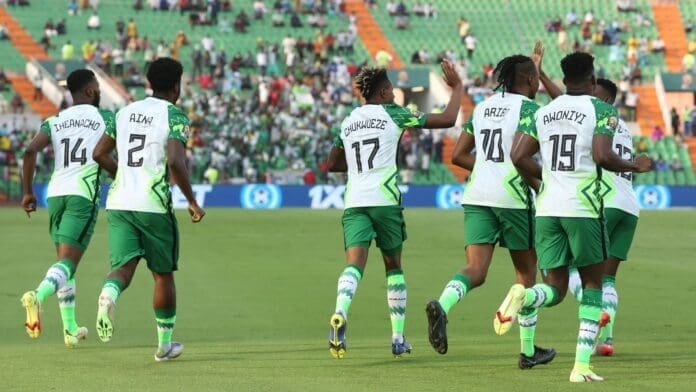Nigeria’s Super Eagles will likely face Gabon in the semi-finals of Africa’s final 2026 World Cup qualifying tournament, with seeding based on FIFA rankings determining the matchups for the November showdown in Morocco.
The Confederation of African Football confirmed the playoff format in a circular to member federations, laying out exactly how the last World Cup spot will be decided. Morocco hosts the mini-tournament on November 13 and 16, bringing together the four best second-place finishers from the nine qualifying groups. It’s winner takes all, with just one team advancing to the intercontinental playoff in March 2026.
CAF’s seeding system follows FIFA regulations precisely. The highest-ranked team among the four qualifiers faces the lowest-ranked side, while the other two meet in the second semi-final. Based on current FIFA rankings, that creates a clear picture of what’s coming, though the official October 23 rankings release will confirm everything.
Nigeria sits at number 45 in the world rankings, making them the top seed among the playoff participants. Cameroon follows at 52, DR Congo at 60, and Gabon at 79. Those numbers produce two compelling semi-final matchups: Nigeria against Gabon, and Cameroon facing DR Congo. Both games promise intensity, given the historical rivalries and what’s riding on the outcomes.
The Super Eagles secured their playoff berth with a convincing 4-0 victory over Benin on the final day of group qualifiers. That performance demonstrated the attacking capability Eric Chelle’s squad possesses when everything clicks, though consistency throughout the qualification campaign left something to be desired. Now they get another opportunity to reach the World Cup, albeit through a more challenging route than automatic qualification.
Gabon represents a manageable opponent on paper, ranked 34 places below Nigeria. However, knockout football rarely follows script, especially when teams have nothing to lose and everything to gain. The Panthers have talented individuals who can punish defensive lapses, and one-off matches create opportunities for upsets that two-legged ties might prevent.
Morocco’s hosting duties make strategic sense beyond its modern infrastructure. The nation is preparing for the 2025 Africa Cup of Nations, meaning venues are already receiving upgrades and operational testing. CAF selected Morocco as a reliable host with proven capability to organize major tournaments on short notice.
Tournament rules allow five substitutions per team, with a sixth available if matches reach extra time. That flexibility gives coaches tactical options to manage player fitness across the condensed schedule, though squad depth becomes crucial if teams advance through multiple matches within four days.
Any tied matches after 90 minutes proceed to extra time, with penalty shootouts serving as the final tiebreaker if necessary. There’s no home advantage to leverage, no second leg to fall back on, just 90 minutes plus potential extras to determine who continues and who goes home.
The winner in Morocco doesn’t celebrate World Cup qualification just yet. They earn a spot in the intercontinental playoffs next March, facing opponents from Asia, South America, Oceania, or CONCACAF. That represents Africa’s 10th and final berth in the expanded 48-team World Cup format, requiring one more victory to actually reach the tournament proper.
For Nigeria, this path wasn’t what supporters expected when qualification began. The Super Eagles typically handle African qualifying with more comfort, making this playoff situation feel like underachievement despite the team’s continental pedigree. Three African championships speak to Nigeria’s historical dominance, yet here they are needing two playoff victories just to reach another playoff.
Cameroon and DR Congo bring their own championship credentials and quality squads to Morocco. The Indomitable Lions won five African titles, while Congo claimed two. Gabon lacks that trophy cabinet depth but possesses players capable of causing problems for any opponent on their day.
Nigerian fans will watch the October 23 FIFA rankings release closely, hoping their team maintains that number 45 position to confirm the Gabon matchup. Any significant ranking changes could alter the semi-final pairings, though the current standings appear relatively stable.
The compressed tournament format eliminates preparation time between matches. Coaching staffs need contingency plans ready, tactical flexibility to adjust quickly, and medical teams prepared to manage player recovery with minimal rest between potentially grueling encounters.
Morocco’s November weather provides comfortable playing conditions, avoiding the extreme heat that sometimes affects African matches. Neutral venues theoretically level the playing field, though teams from North Africa might feel slightly more at home in Moroccan stadiums than their sub-Saharan counterparts.
This playoff tournament represents more than just World Cup qualification. It carries financial implications through FIFA prize money and sponsorship opportunities, while offering players a global stage that can transform careers and attract European club interest. National pride matters enormously, but practical benefits extend well beyond emotional satisfaction.
Nigeria’s squad contains the talent necessary to navigate this challenge successfully. Whether they execute under pressure when elimination looms after every mistake remains the critical question. Championship experience helps in these situations, and the Super Eagles have that quality even if recent qualifying performances raised doubts.
Source: newsghana.com.gh











